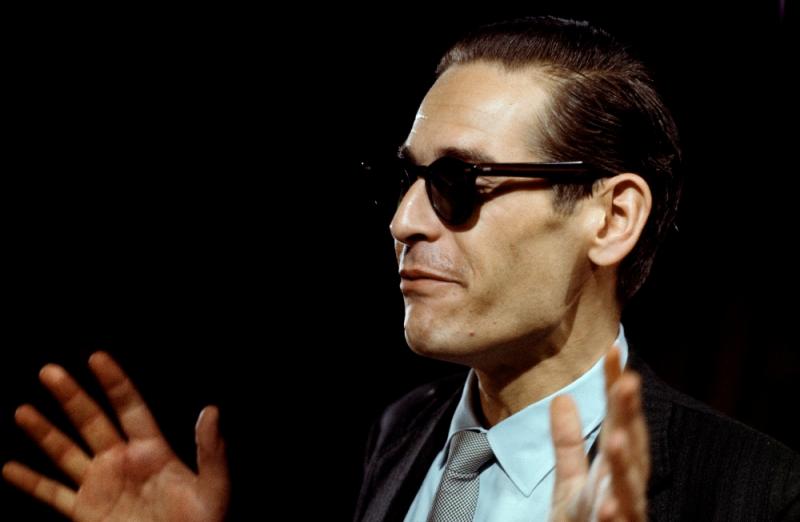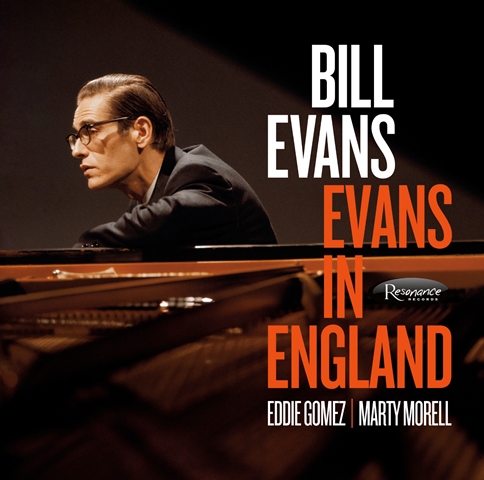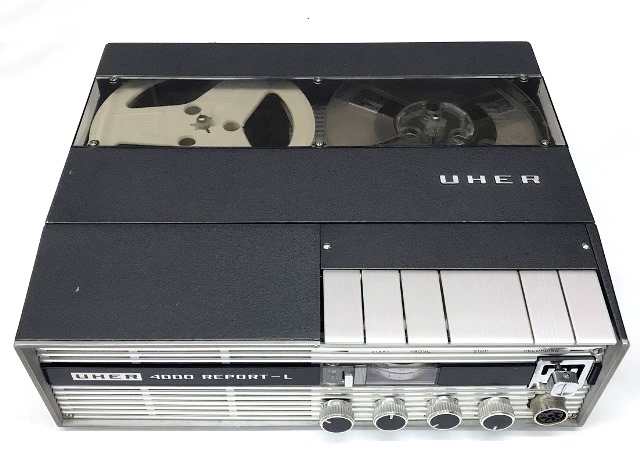Reissue CDs Weekly: Bill Evans - Evans in England | reviews, news & interviews
Reissue CDs Weekly: Bill Evans - Evans in England
Reissue CDs Weekly: Bill Evans - Evans in England
Fan-friendly collection of previously unissued 1969 live recordings

The Bill Evans Trio played London’s Ronnie Scott’s from 1 to 27 December 1969 as a co-billing with Blossom Dearie. The season would have remained less than a footnote if it were not for a French fan identified only as ”Jo” in Evans in England’s booklet.
This was no mean feat. The Uher model mostly in use at the time was the Report 4000 (pictured below left). Though small, it weighs just under seven pounds. A Beyerdynamic microphone is a stick-like model with a bulb at the business end. It was positioned on the floor. “Jo” had some chutzpah. Evans himself, according to the booklet’s liner notes, later became aware of his dedicated fan’s activities and acquired dubs of some of the illicit recordings. Now, what was taped in London is available for anyone.
 Elsewhere, there is no shortage of aural evidence for what Bill Evans was up to in 1969. Recordings of the revered pianist in his then-extant trio format with bassist Eddie Gomez and drummer Marty Morell are not thin on the ground. November 1969 shows from Amsterdam and Copenhagen have been issued. So has a Pescara, Italy booking from the preceding July. At the time, selections from New York dates in January, February and March 1969 with the trio supplemented by flautist Jeremy Steig were issued on the What's New album.
Elsewhere, there is no shortage of aural evidence for what Bill Evans was up to in 1969. Recordings of the revered pianist in his then-extant trio format with bassist Eddie Gomez and drummer Marty Morell are not thin on the ground. November 1969 shows from Amsterdam and Copenhagen have been issued. So has a Pescara, Italy booking from the preceding July. At the time, selections from New York dates in January, February and March 1969 with the trio supplemented by flautist Jeremy Steig were issued on the What's New album.
There were also – during October and November 1969 – the initial sessions for what would become the From Left to Right album, which was released in 1970. The first record featuring Evans on electric piano as well as acoustic, it filled out trio’s sound with arrangements devised by Michel Legrand.
Evans in England captures Evans during a magpie-minded phase in his career; when he was reaching out by supplementing his basic line-up with other instruments yet still playing bread-and-butter shows such as the Ronnie Scott's season with Gomez and Morell. Evans in England is issued as double CD and double album, but only the former was submitted for review.
Neither the liner notes or the promotional material say whether what’s heard is from one show, or if the track sequencing follows the order of a single set or series of sets. “Jo”, the liner notes declare, “was very discreet on the circumstances of the recordings.” Imponderables aside, what has been issued has fine sound quality, a well-defined dynamic range and has no background noise. Beyond applause, there are no audience contributions. If the history was unknown, this would pass as a professionally recorded release.
 Eighteen tracks are heard. The most appropriate to the contemporaneous moment is a precise rendering of “What Are You Doing for the Rest of Your Life?”, a Michel Legrand composition first heard as part of the soundtrack of the 1969 film The Happy Ending. Evans’s recent work with Legrand was still on his mind. “So What” is also roughly immediate as a version with Jeremy Steig had been included on the What's New album.
Eighteen tracks are heard. The most appropriate to the contemporaneous moment is a precise rendering of “What Are You Doing for the Rest of Your Life?”, a Michel Legrand composition first heard as part of the soundtrack of the 1969 film The Happy Ending. Evans’s recent work with Legrand was still on his mind. “So What” is also roughly immediate as a version with Jeremy Steig had been included on the What's New album.
“So What” is an additionally intriguing inclusion as Evans had also recorded it during his brief late-Fifties spell with Miles Davis who had played Ronnie Scott’s in November 1969, a few weeks before Evans’s spell at the club. At that booking Davis’s drummer was Jack DeJohnette, who had been with Evans in 1968 – he was replaced by Marty Morell. There is a strange circularity in Evans referencing various aspects of his own past by revisiting “So What”.
Otherwise, Evans roams freely. The set's opening version of Gershwin’s “Our Love is Here to Stay” – which Evans first brought out on record in 1963 – is somewhat disconcertingly disrupted by Gomez launching into an 80-second bass solo only 39 seconds in. After this digression, Evans picks up the flow and pushes the tempo forward. As it puts the bandleader in the backseat, this is an offbeat opener. “Sugar Plum” and “The Two Lonely People” are interesting as Evans issued versions in 1971. Looking back and forward went hand-in-hand
Overall, what comes across is a band which was comfortable with itself. “Come Rain or Come Shine”, “Re: Person I Knew” and “My Foolish Heart” would have been well known to audience and band alike, but an ease and fluidity about the interplay and playing underlines the immediacy of the performances.
Beyond its explicit acknowledgment that Evans was happy to stay in the background – “Stella By Starlight” features a lengthy bass and drums excursion – Evans in England is resolutely a release for the committed, especially as many of the pieces are about the playing rather than melody. Still, this is not going to be a problem for fans.
- Next week: Manfred Mann, The Searchers and The Yardbirds – new packages from the endlessly reissued Sixties bands
- Read more reissue reviews on theartsdesk
- Kieron Tyler’s website
Explore topics
Share this article
The future of Arts Journalism
You can stop theartsdesk.com closing!
We urgently need financing to survive. Our fundraising drive has thus far raised £49,000 but we need to reach £100,000 or we will be forced to close. Please contribute here: https://gofund.me/c3f6033d
And if you can forward this information to anyone who might assist, we’d be grateful.

Subscribe to theartsdesk.com
Thank you for continuing to read our work on theartsdesk.com. For unlimited access to every article in its entirety, including our archive of more than 15,000 pieces, we're asking for £5 per month or £40 per year. We feel it's a very good deal, and hope you do too.
To take a subscription now simply click here.
And if you're looking for that extra gift for a friend or family member, why not treat them to a theartsdesk.com gift subscription?
more New music
 Moroccan Gnawa comes to Manhattan with 'Saha Gnawa'
Trance and tradition meet Afrofuturism in Manhattan
Moroccan Gnawa comes to Manhattan with 'Saha Gnawa'
Trance and tradition meet Afrofuturism in Manhattan
 Soulwax’s 'All Systems Are Lying' lays down some tasty yet gritty electro-pop
Belgian dancefloor veterans return to the fray with a dark, pop-orientated sound
Soulwax’s 'All Systems Are Lying' lays down some tasty yet gritty electro-pop
Belgian dancefloor veterans return to the fray with a dark, pop-orientated sound
 Music Reissues Weekly: Marc and the Mambas - Three Black Nights Of Little Black Bites
When Marc Almond took time out from Soft Cell
Music Reissues Weekly: Marc and the Mambas - Three Black Nights Of Little Black Bites
When Marc Almond took time out from Soft Cell
 Album: Mobb Deep - Infinite
A solid tribute to a legendary history
Album: Mobb Deep - Infinite
A solid tribute to a legendary history
 Album: Boz Scaggs - Detour
Smooth and soulful standards from an old pro
Album: Boz Scaggs - Detour
Smooth and soulful standards from an old pro
 Emily A. Sprague realises a Japanese dream on 'Cloud Time'
A set of live improvisations that drift in and out of real beauty
Emily A. Sprague realises a Japanese dream on 'Cloud Time'
A set of live improvisations that drift in and out of real beauty
 Trio Da Kali, Milton Court review - Mali masters make the ancient new
Three supreme musicians from Bamako in transcendent mood
Trio Da Kali, Milton Court review - Mali masters make the ancient new
Three supreme musicians from Bamako in transcendent mood
 Hollie Cook's 'Shy Girl' isn't heavyweight but has a summery reggae lilt
Tropical-tinted downtempo pop that's likeable if uneventful
Hollie Cook's 'Shy Girl' isn't heavyweight but has a summery reggae lilt
Tropical-tinted downtempo pop that's likeable if uneventful
 Pop Will Eat Itself's 'Delete Everything' is noisy but patchy
Despite unlovely production, the Eighties/Nineties unit retain rowdy ebullience
Pop Will Eat Itself's 'Delete Everything' is noisy but patchy
Despite unlovely production, the Eighties/Nineties unit retain rowdy ebullience
 Music Reissues Weekly: The Earlies - These Were The Earlies
Lancashire and Texas unite to fashion a 2004 landmark of modern psychedelia
Music Reissues Weekly: The Earlies - These Were The Earlies
Lancashire and Texas unite to fashion a 2004 landmark of modern psychedelia
 Odd times and clunking lines in 'The Life of a Showgirl' for Taylor Swift
A record this weird should be more interesting, surely
Odd times and clunking lines in 'The Life of a Showgirl' for Taylor Swift
A record this weird should be more interesting, surely

Add comment